This is Edward Slavsquat’s third dispatch from Czechia. (Don’t forget to read and/or reread Part I & Part II). If you visit this blog solely for Russia-related news, I apologize and you can skip this internet story or even unsubscribe out of disappointment and utter disgust.
“I’m glad we started with wine. Beer would have been a mistake,” Marko Marjanović told your correspondent as we lounged lackadaisically at an outdoor café in the former capital of Moravia at nine in the morning.
“I completely agree. But now there is the question of what to do for the rest of the day,” I said to my esteemed blog-colleague and friend.
“Is there anything to do in Brno?” Marko asked.
“Heavens no,” I replied.
We both took cultured 9:01 am sips of our white wine, making sure not to gargle it or swallow it all by accident.
It was already shaping up to be one of the better mornings on record, but my duties and responsibilities started to weigh heavily on my mind. Marko traveled all the way from Slovenia—by bus, bless him—to visit me in the former capital of Moravia, where absolutely nothing happens. But I was his host and I had a moral obligation to entertain him.
An idea slowly formed and bubbled to the forefront of my noodle.
“We could visit Austerlitz,” I suggested, as I twirled my wine glass to show how sophisticated I was at 9:02 am.
“It’s nearby?” Marko inquired.
“A 30-minute train ride. And we can sample more fermented grapes on the train.”
“There’s no reason not to go.”
“My thinking exactly.”
“It’s settled, then,” Marko said.
“It’s completely settled.”
We both took highly cultured 9:03 am samples of our white wine.
“Do you know how Napoleon won the battle?” Marko, who is very well-read on these sorts of subjects, quizzed me.
“No idea. Fill me in.”
“The French were outnumbered so Napoleon deliberately weakened his left flank and strengthened his right flank, allowing him to counterattack the Third Coalition’s frontal assault. […] You see, the Russian muskets were manufactured in Tula. […] The tactic is known as a ‘center-peel’. […] Despite their best efforts, the Prince of Lichtenstein’s heavy cavalry were unable to stop the advance of Murat’s two cuirassier divisions, leading to predictable results as I’m sure you can probably imagine. […] It was all over once Marshal Soult took Pratzen Heights. […] There is still a vigorous debate about whether Marshal Lannes and his V Corps should have pursued the retreating Russians under the command of Prince Bagration, who reportedly suffered from ulcers. […] Francis II was an imbecile. […]”
There was about fifteen minutes of this.
“Marko, we’re going to miss our train if we don’t start walking…”
We bought a bottle of wine on the way to the railway station and boarded our train.
“It’s O.K. to drink on the train?” Marko asked as I opened the bottle.
“This is clearly your first train journey in the South Moravia Region. Look around you, my friend.”
Marko carefully surveyed the passenger car. He observed a group of teenagers sitting in seats reserved for pregnant women and cripples as they passed around a bottle of Fernet; then he locked eyes with an elderly woman opening a can of Staro Brno as she stared suspiciously at him.
The train lurched forward, and our adventure officially began. Marko and I made pleasant small talk as kilometers of countryside rolled past us.
“We don’t have many trains in Slovenia. The terrain is too mountainous.”
“What do you have instead?”
“Ski jumping.”
“So you ski jump from town to town in Slovenia?”
“No, we use cars. But we like to ski jump.”
“Ah, cars. Of course.”
“Cars have created millions of Bubble Boys. This idea that you can travel at your leisure without any kind of contact with the outside world is spawning generations of neurotics. People can’t even look at each other anymore when they travel together,” Marko said.
I nodded enthusiastically and shared my observations as a veteran Muscovite.
“In the Moscow metro everyone tries their hardest not to look at anybody. People gaze at the ceiling of the subway car, or stare at their shoes, or pretend to type something important on their phone. Obviously I do my utmost to look at everyone. And what interesting faces! At least once a week I would think to myself: ‘that lady over there is probably the most beautiful woman I’ve ever seen in my entire life.’ And then I’d get off at my stop and five seconds later I’d forget everything about her, and wouldn’t even be able to tell you why I thought she was so pretty in the first place. Sometimes I wonder if all aspects of life are like this.”
“I think we should only drink wine today,” Marko interjected.
“A scientific exploration that would make Dr. Anthony Fauci proud. But haven’t you tried this controlled experiment before?”
“No. We drink beer in Slovenia.”
“What kind?”
“Red or green.”
“What?”
What followed was a lecture that forever changed my understanding of Slovenia.
Here’s what I remember from Marko’s impromptu TEDx Talk: There is a Red Beer and a Green Beer, and in certain regions of Slovenia people drink the Red Beer, and in the other parts of Slovenia the Green Beer is dominant, and if you try to order a Green Beer in Red Beer territory, or vice versa, you’re risking serious Slovenian trouble. At the same time, the brewery that makes the Red Beer relocated to the same town where the Green Beer is made—or maybe it’s the other way around—and in reality Slovenians exist in a False Beer Dichotomy in which Heineken controls both sides of this bitter, hops-infused rivalry. And yet this deep and often vicious societal division persists because Slovenians want to pretend they have a meaningful beer choice—out of tradition, or stubbornness, or because hating the Other Beer is all they have left.
“I had no idea it was like this in Slovenia,” I admitted to Marko.
“It’s like this in Slovenia,” Marko replied, as he motioned for the wine bottle.
In no time at all we arrived in Slavkov u Brna, which is the Czech name for Austerlitz that nobody uses. We spotted a German-owned supermarket chain in the distance.
I closed my eyes and tried to imagine what used to be there before Lidl.
Grainy images of fluttering regimental flags and synchronized marching began to materialize in my mind. I opened my eyes, and as if by magic a German-manufactured car speeding down the street transformed into a galloping hussar in a fine feathered hat and a fur-trimmed pelisse. I pressed my ear to the wind and swore I could hear martial tunes from red-cheeked boys playing drums and fifes for a brigade of gallant grenadiers, their polished belt buckles sparkling in the sunlight. Near the Lidl a stout man with a sagging belly was walking his Pomeranian, who for a split second morphed into an officer of noble birth bedecked in a soft red sash and a ceremonial gorget, his hand on his hip as he strutted back and forth.
I could nearly smell the sweet perfume of gunpowder and the flowery aromas of gangrene. Squinting at the tourist-trap town center in the distance, I almost hallucinated a prudent bayonet charge for a piece of dirt that would later become the European Union anyway. I scanned the horizon for mangled drummer-boys, their youthful faces caved in by cannon balls. Wait—was that the buzzing of an electric scooter, or the faint screams of a handsome, torn-in-half grenadier begging for someone to shoot him? Were my eyes deceiving me, or was that garbageman actually a hard-working army surgeon tossing another amputated leg into a pile of hussar limbs? As we approached the town center, I imagined there was once a soldier standing exactly where I was standing, who celebrated his glorious victory at Austerlitz by shoving his hands under the petticoat of a girl as she watched her house burn to the ground.
“It’s difficult to imagine that a great battle for the preservation of Europe and Western Values was fought here. I only see a Lidl,” I said to my comrade with a deep sigh.
“I know what you mean. Maybe we should have another glass of wine,” Marko proposed.
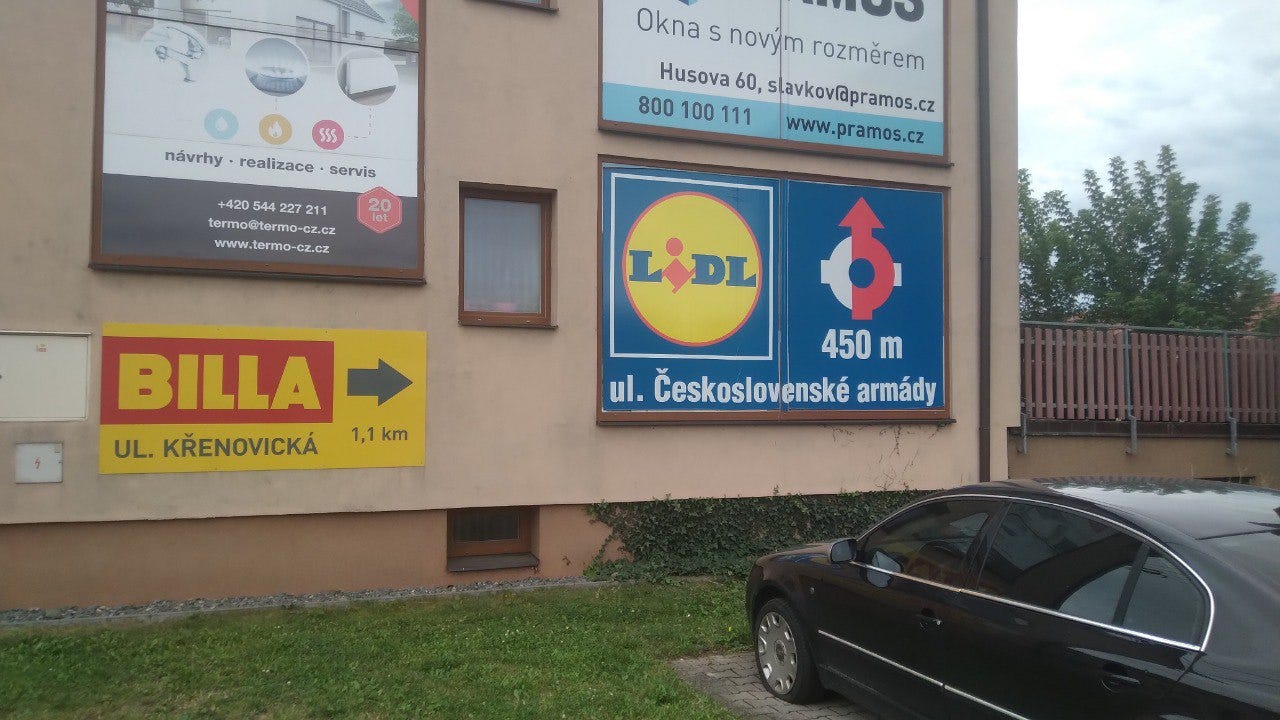
I could not deprive my friend of such a reasonable request, and we soon found ourselves lounging on the terrace of the Three Emperors Bar & Grill in downtown Slavkov u Brna, partaking in extraordinarily refined slurps of white wine at 10:58 am.
“Well, what now?” Marko asked as he assessed our surroundings.

“There’s a museum up the road,” I noted after consulting my Pad.
“Is there?”
“It would be amusing to open a competing museum across the street,” I mused. And then I began to describe to Marko some of the historically significant artifacts that Edward’s Austerlitz Museum of Curiosities would have on display:
A pebble: “This small rock was thrown angrily into a puddle by Field Marshal Kutuzov after his right flank collapsed and hundreds of his men were butchered as they fled in abject terror.”
A Nintendo 64: “The French Emperor’s favorite videogame console, which he brought with him on all his murderous campaigns. After a long day of waging total war against the entire European continent, Napoleon would often unwind with a relaxing game of Donkey Kong.”
A bottle of Božkov: “This is a bottle of fake potato rum. You can buy one just like it at Lidl.”
“I’d buy a ticket,” Marko said.
“Entrance would be free thanks to generous subsidies from the European Union,” I explained.
After another glass of wine we decided to visit the already existing museum, which was housed in a baroque condo built by 18th century oligarchs.
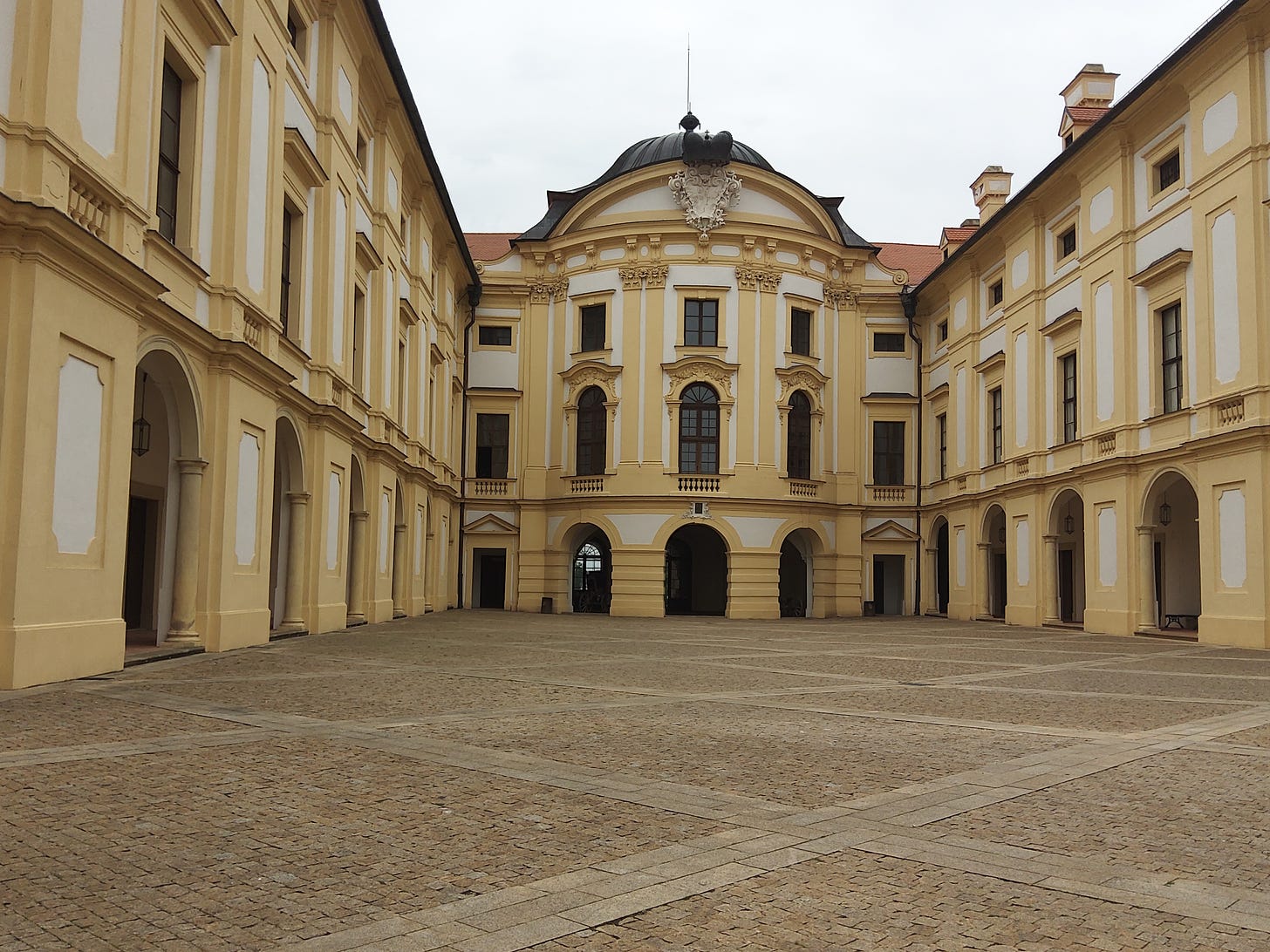
Entrance wasn’t free, and neither of us expressed any interest in paying for a ticket, and so our access to Austerlitz-related treasures was somewhat limited.
We did see a cannon, though.
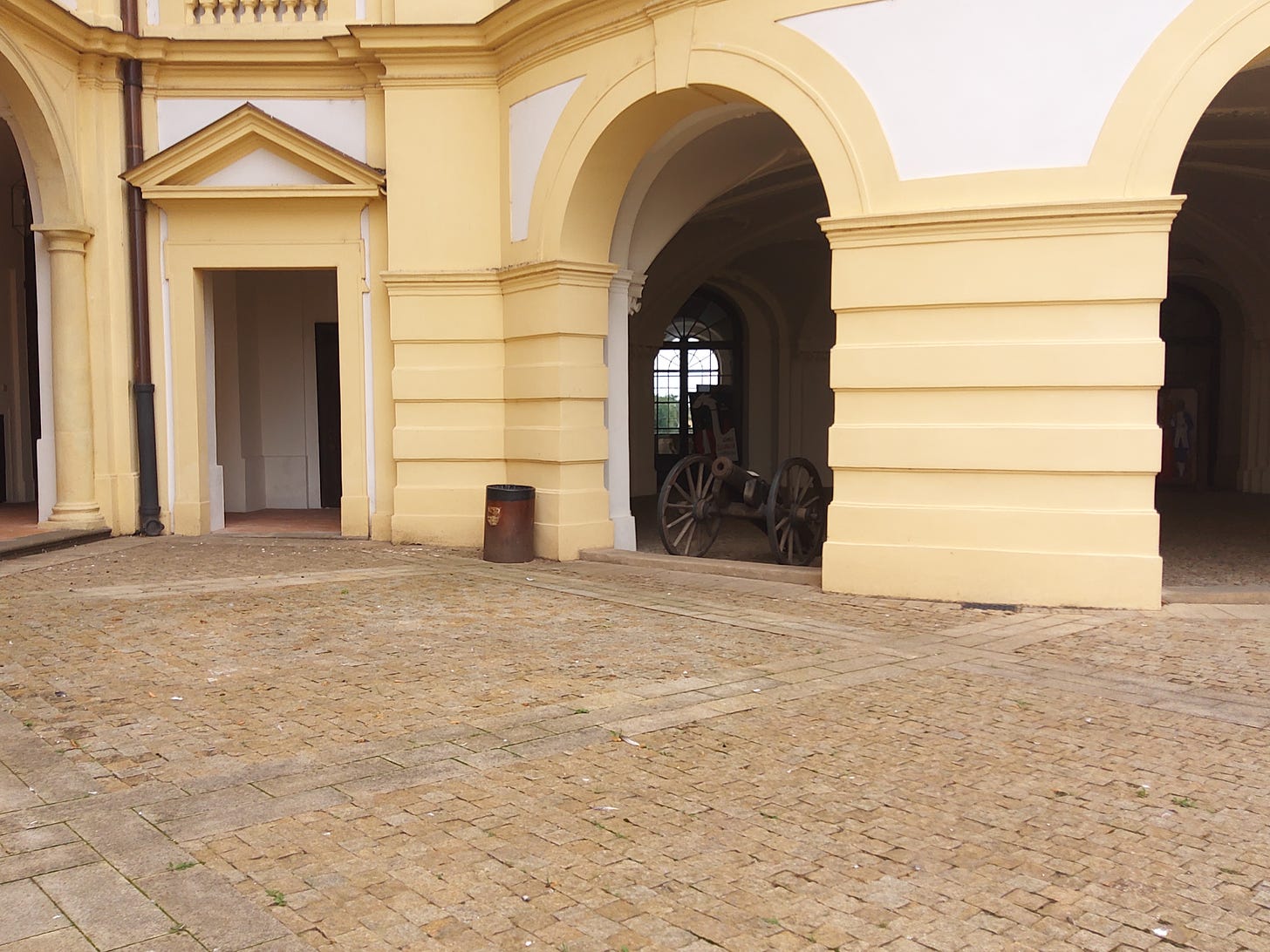
As non-ticket holders we also had the privilege of admiring a dry moat that had been converted into an overpriced café.
It was at this moment that it started to rain.
“We haven’t seen the actual battlefield,” Marko said.
“It’s just a meadow,” I reassured him.
“We could buy some umbrellas at Lidl and make the trek.”
“Umbrellas are for cowards and South Korean girls who use them to shield their fair skin from the sun’s life-giving rays,” I correctly observed.
“We at least need to buy postcards to prove we were here.”
“Sure. There’s a post office across the street.”
But Česká Pošta didn’t have postcards. As Marko and I soon discovered, Česká Pošta doesn’t actually send letters, or even deliver the mail. It only sells lottery tickets.
“Welcome to Česká Pošta! We have lotto tickets for 20 crowns, 60 crowns, 120 crowns, or for the high-rollers—and you two gentlemen look like you’re ready to win and win big—we have the 500-crown Your Wife Is Leaving You & Taking The Kids Super-Mega Scratch Ticket,” a voluptuous woman in a sterile uniform almost shouted at us from behind a wall of plexiglass.
“Uh, do you sell…postcards?” I asked timidly.
“Postcards? This is Česká Pošta. Get out before I call the police.”
Marko insisted we take a rainy selfie in front of the post office to commemorate this devastating and humiliating defeat. The resulting images have been classified for National Security purposes.
“The Czech government wants us to spend all of our money on lotto tickets, and doesn’t want us to send postcards honoring one of the Top 100 Most Glorious Battles For The Future Of Europe, but I wager the private sector would be more than happy to sell us lotto tickets and postcards. Let’s check the local trafika,” I told Marko, using the correct Czech word for “seedy shop that sells cigarettes, booze and lotto tickets.”
“Your Czech isn’t bad, Waggaman, but you don’t pronounce Brno correctly. You’re putting a U after the R. There’s no U,” Marko chided me.
“I can’t roll my Rs.”
“The Rs aren’t the issue. It’s the extraneous Us.”
We continued our discussion as we walked in the rain to the nearest tobacco shop.
My thesis was correct. The trafika had a wide selection of postcards on offer. Your correspondent was so spoiled for choice that he even bought a “Happy 75th Birthday” card featuring a frothy beer and a pipe. If you are turning 75 in the near future I will gladly send it to you with my warmest greetings.
“Now everyone will know we visited the historic battlefield of Austerlitz and paid our respects to the heroic fallen,” your correspondent said solemnly.
“Postcards don’t lie,” Marko confirmed.
We marched back to the train station—reveling in our wet, Pyrrhic victory—passing Lidl on the way.
That evening we inexplicably found ourselves at an absinthe bar in the former capital of Moravia. The absinthe was served in small little dollops, which we were supposed to dilute with water from a samovar-looking contraption. Marko and I drank our absinthe straight, triggering furious protests from the absinthe bar bartender.
“We’ve contaminated the experiment,” Marko said to me.
“What?”
“Only wine,” Marko reminded me.
“I guess we’ll have to redo the experiment tomorrow.”
Just then I received a message on my Pad.
“We’ve been invited to some sort of liberal wine thing,” I informed Marko.
“Sorry, what?”
“Tomorrow. In Mikulov. That’s near Austria.”
“Yes, but what exactly will we be doing there?”
“I haven’t the slightest idea. But I can promise you there will be liberals and wine, in a castle.”
“I’m not sure about this, Waggaman.”
“You don’t have to be sure, Marjanović. No one is sure in 2023. You just have to be willing.”
TO BE CONTINUED…
Thank you for reading Edward Slavsquat. Your readership is highly valued.

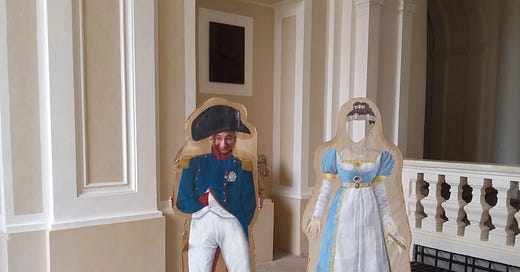




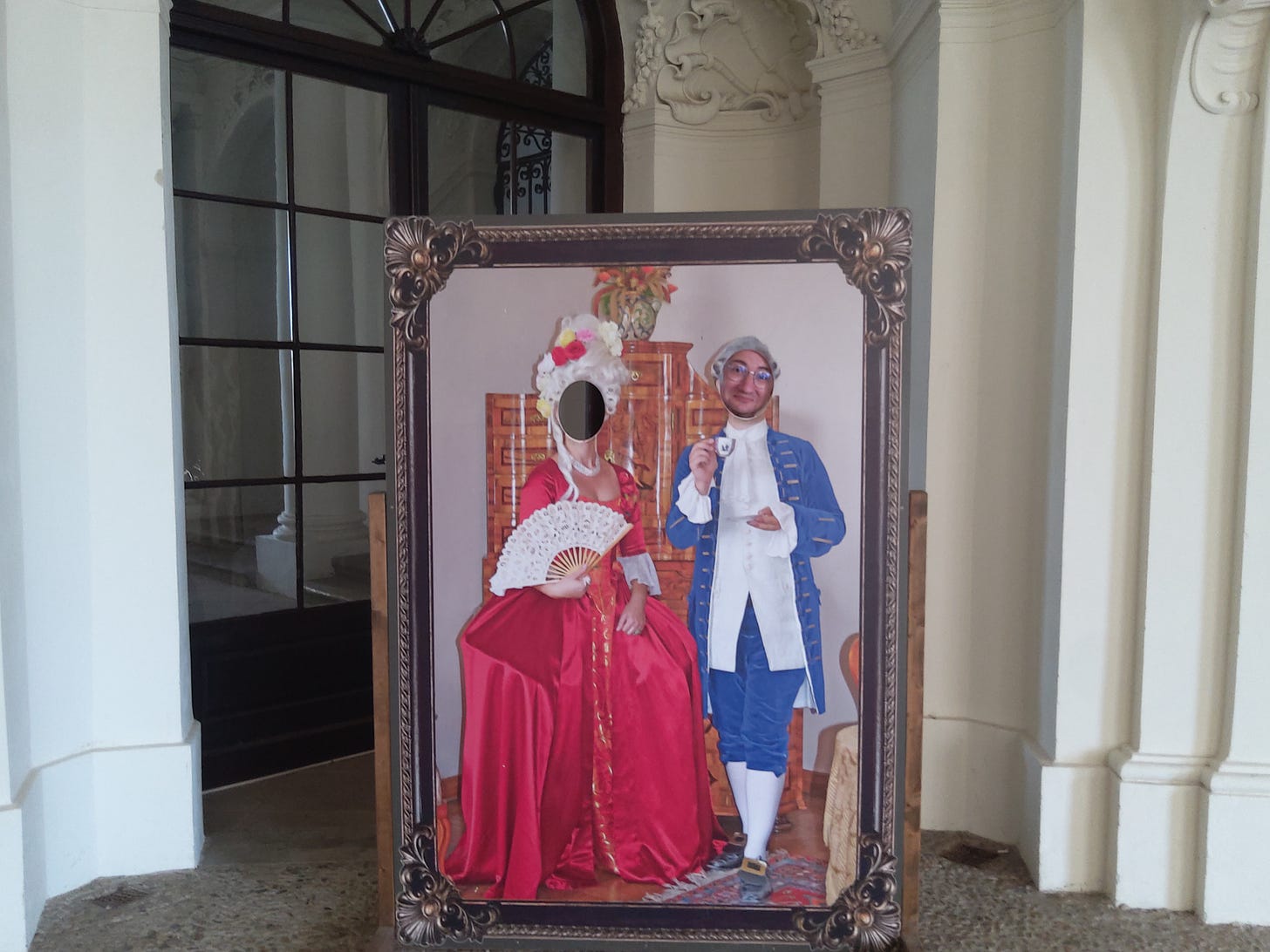
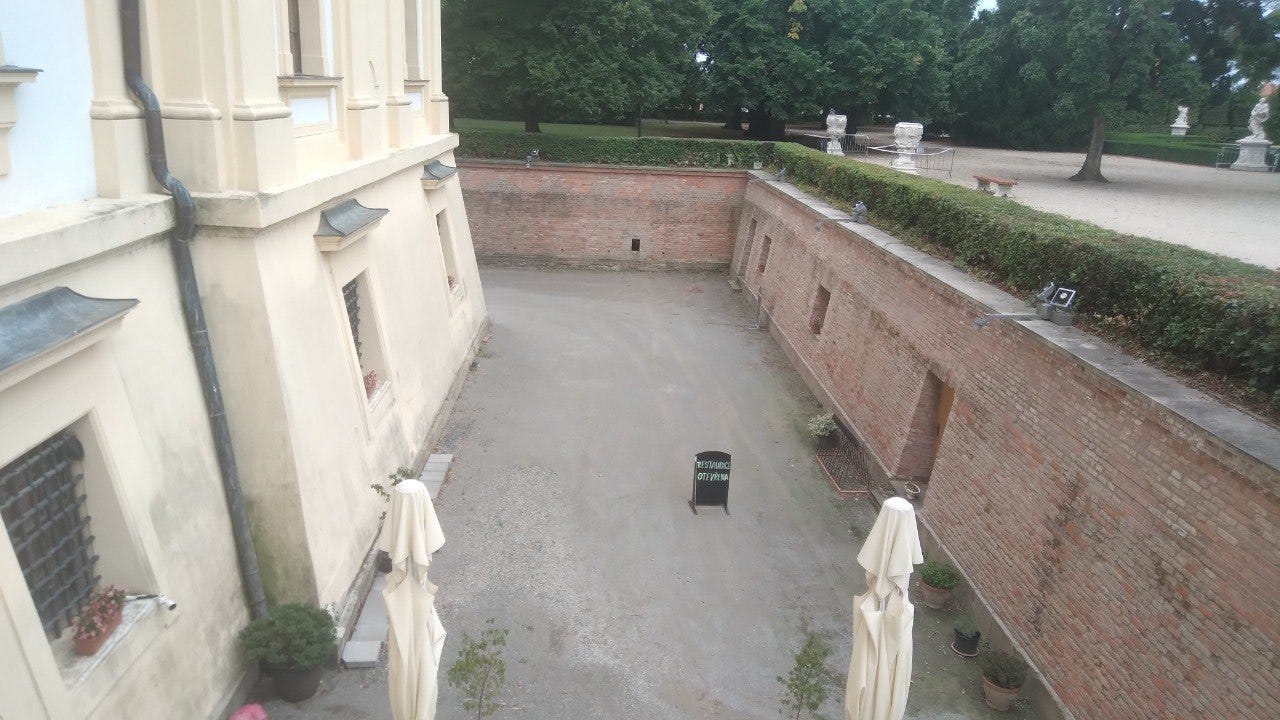

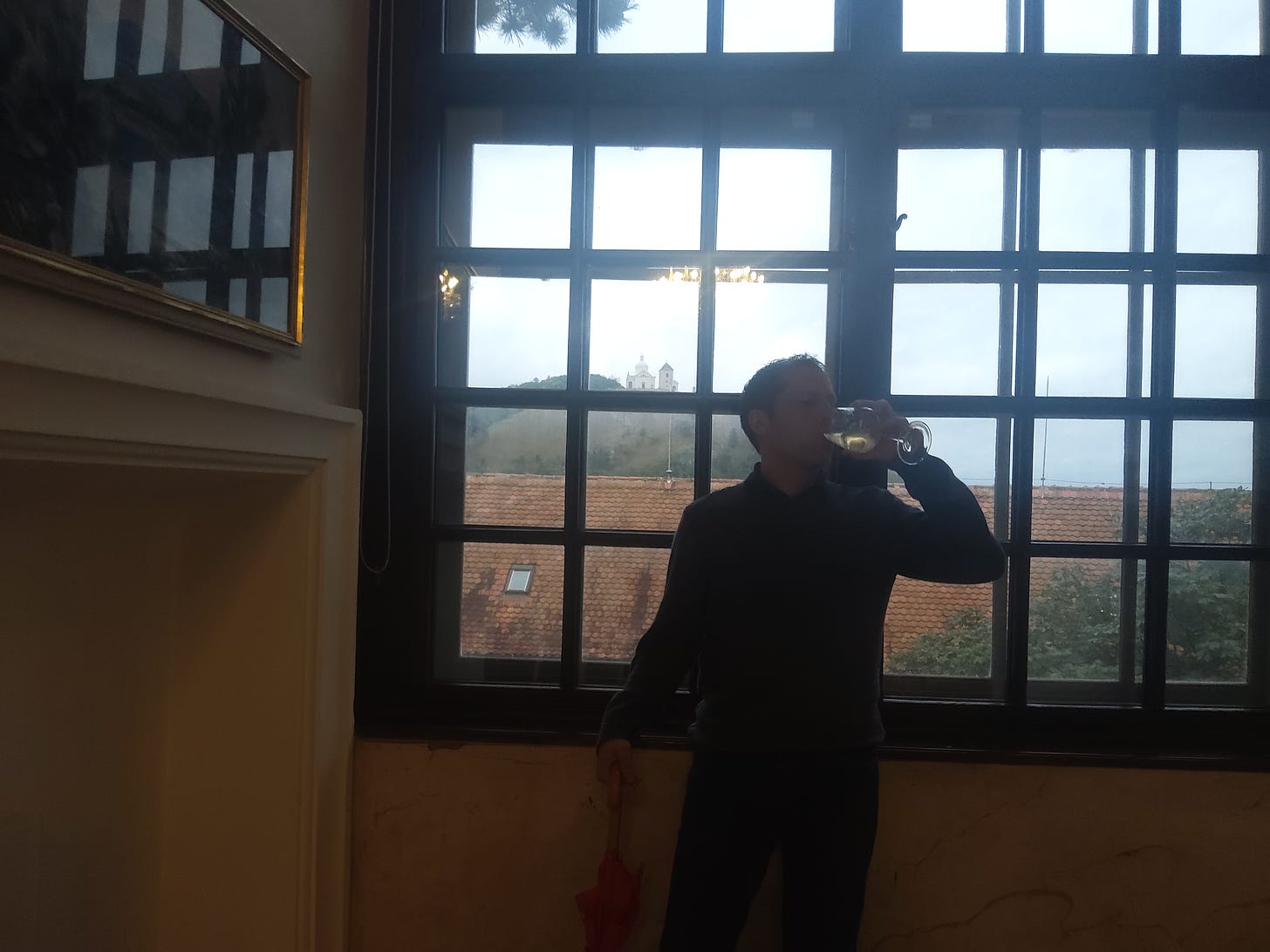
Thank you, made me smile and laugh, your lovely black humor!! Here in thevstates, Ohio, only time people look is when I am walking in the park, most nod and say good morning., except for the woman who says there are cameras
everywhere, she probably right, but she uses her arms as she walks in angles, to ward off pictures she says of her. Idk. But in stores, no,⁹ and I often wonder why we avoid eye contact, I want smiles, hellos, caring, oh well, most look stressed, I'm stressed , but I still try to be pleasant.
Living in a neighboring country to Czechia, reading Riley's post feels so natural. I can only wonder if it feels exotic to people living far away - as he was chasing mythical dodo birds around Mauritius.
So here's a little exotic tidbit from our neck of the woods:
Street names went through stunning & brave transformation in last few decades in Eastern Europe. Before 1989, street names had to be another cog in socialistic propaganda machine, so the street names were related to Soviet statesmen, generals, Soviet and E.European towns etc. So the street where I lived was Blagoevgrad street, named after a small town in Bulgaria, likely there was some partnership and mayors were penpals.
After 1989 came era of uncritical adoration of the west, so my street name was promptly changed to Pittsburg street (more penpal friends amongst nobility?)
And then finally came era of national awakening and the street name was changed to a local poet.
Since it is not in globalist interests to promote pride in anything national, I predict the street name will be changed eventually to Bill Gates Abbatoir.